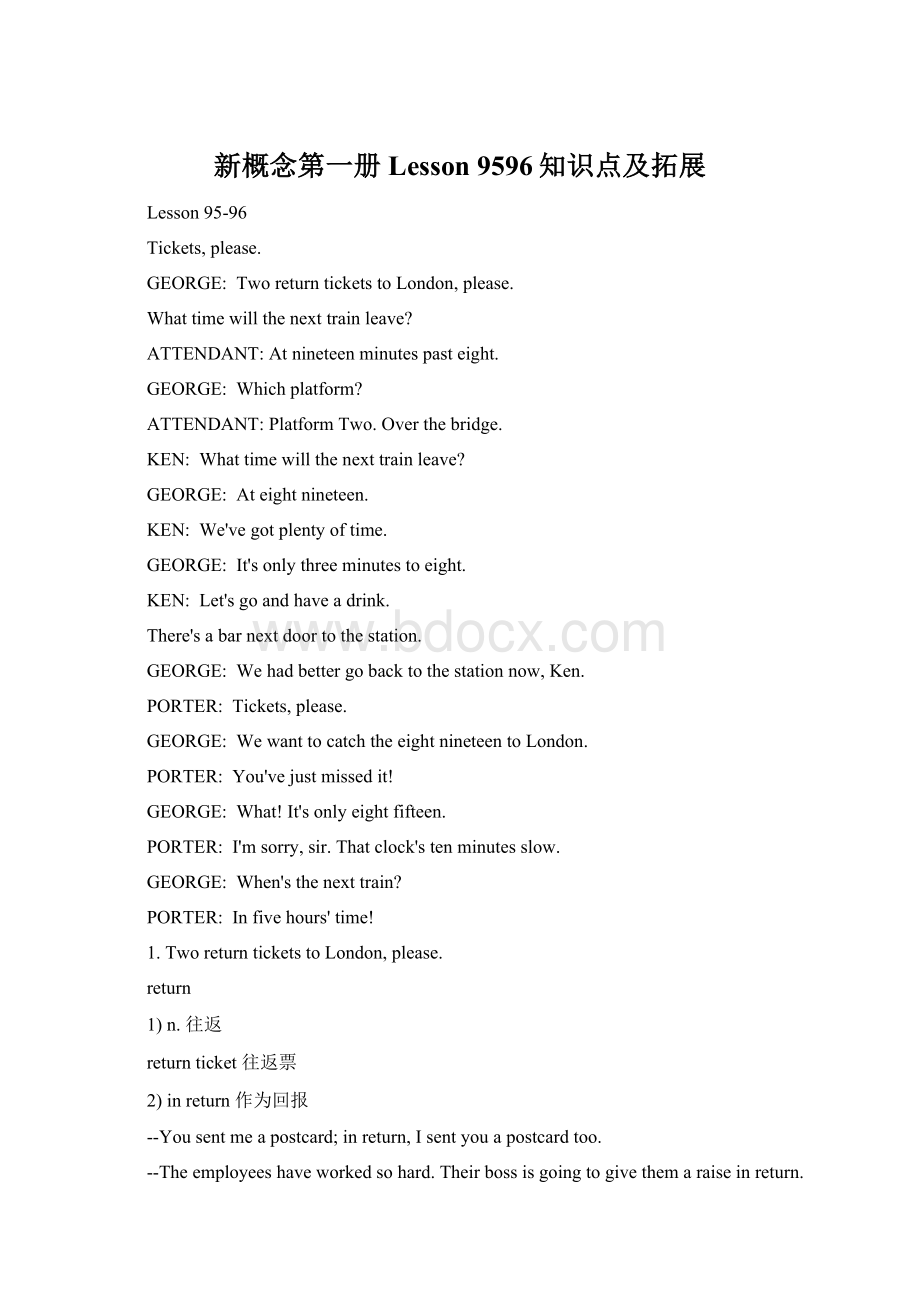新概念第一册Lesson 9596知识点及拓展.docx
《新概念第一册Lesson 9596知识点及拓展.docx》由会员分享,可在线阅读,更多相关《新概念第一册Lesson 9596知识点及拓展.docx(11页珍藏版)》请在冰豆网上搜索。

新概念第一册Lesson9596知识点及拓展
Lesson95-96
Tickets,please.
GEORGE:
TworeturnticketstoLondon,please.
Whattimewillthenexttrainleave?
ATTENDANT:
Atnineteenminutespasteight.
GEORGE:
Whichplatform?
ATTENDANT:
PlatformTwo.Overthebridge.
KEN:
Whattimewillthenexttrainleave?
GEORGE:
Ateightnineteen.
KEN:
We'vegotplentyoftime.
GEORGE:
It'sonlythreeminutestoeight.
KEN:
Let'sgoandhaveadrink.
There'sabarnextdoortothestation.
GEORGE:
Wehadbettergobacktothestationnow,Ken.
PORTER:
Tickets,please.
GEORGE:
WewanttocatchtheeightnineteentoLondon.
PORTER:
You'vejustmissedit!
GEORGE:
What!
It'sonlyeightfifteen.
PORTER:
I'msorry,sir.Thatclock'stenminutesslow.
GEORGE:
When'sthenexttrain?
PORTER:
Infivehours'time!
1.TworeturnticketstoLondon,please.
return
1)n.往返
returnticket往返票
2)inreturn作为回报
--Yousentmeapostcard;inreturn,Isentyouapostcardtoo.
--Theemployeeshaveworkedsohard.Theirbossisgoingtogivethemaraiseinreturn.
3)v.回到
returnfrom…to…从…回到…
returnsthtosb=returnsbsth把…归还某人
2.Whattimewillthenexttrainleave?
注意Whattime询问是具体时间的,而When询问的是大概时间。
train
1)n.火车
Takethetrainto...乘火车去......
--We’lltakethe2:
00p.m.traintoShanghai.
2)v.训练,培养
--Heistrainingthehorsefortherace.
--Iwastrainedasanurse.
--Youshouldtrainyourchildrenhowtorespectothers.
3.platform
1)n.站台,月台
anarrivalplatform到站站台
adepartureplatform出发站台
platformNo.2=platform2第二站台
英语中如果有单位的话,通常把数字放在后面:
Class1Grade2二年一班(从小到大)room101101号房间
--I’mwaitingyouatplatform5.
2)n.讲台,讲坛
--Theteacherisstandingontheplatformandlookingatthestudents.
4.We'vegotplentyoftime.
plentyn.大量
plentyof…adj.足够的,充足的。
可以修饰可数名词和不可数名词,
--There'splentyofraininthewestofEngland.
--There'replentyofvegetablesforthedinner.
--We'vegotplentyoftimetodoit.
--Wemusthaveplentyofpeopletodoit.
plentyof…足够的...一般用于肯定句中。
疑问句用enoughadj.足够的;
否定句用much/manyadj.许多的
--Theyhavegotplentyoftime.
--Havetheygotenoughtime?
--Theyhaven’tgotmuchtime.
谓语动词的单复数形式须与其修饰的名词一致。
--Thereisplentyofmilkinmycup.
--ThereareplentyofstudentswhocanspeakgoodEnglish.
plentyof通常用于肯定句。
alotof/lotsof即可接可数名词和不可数名词。
many许多,修饰可数名词,
much 许多,修饰不可数名词。
5.Let'sgoandhaveadrink.
v.让;允许;(用于祈使句表建议、请求、命令)
Let’sdo…祈使句,让我们去做某事。
--Let’sgoandseeafilm/movie.
--Let’sgoswimming.
--Let’sgoshoppingtogether!
6.haveadrink=havesomethingtodrink
7.bar
1)n.酒吧
2)条,棒,棒状物
--abarofchocolate一块巧克力
--abarofgold一块金子
--agoldbar金块(金条)
--barcode条形码
8.Wehadbettergobacktothestationnow,Ken.
gobackto...回到…去
--Let’sgobacktothecinemaandlookforit.
9.hadbetter情态动词,表示最好…...
表达某种建议或忠告,没有人称和数的变化
情态动词hadbetter+动词原形,表示“最好做某事”。
要放在被修饰动词的前面,后跟动词的原型。
注意缩写是’dbetter,
否定形式是hadbetternot
--Youhadbetternotplaywithmatch.
语气比must要轻。
--must表示“必须”语气比hadbetter强
--We’dbetterbecareful.
--Youlookill.You’dbettergotoseethedoctor.
(You’dbetter=Youhadbetter)
--She’dbettertellhimthetruth.
--You’dbetternottalktohimnow.heisn’tinagoodmoodtoday.
--We’dbetternotreturntotheschool.
{can(could),may(might),must,need,oughtto,haveto,
dare(dared),shall(should),will(would),hadbetter.}
10.station
1)n.车站,火车站
arailwaystation火车站
abusstation=abusstop公共汽车站
--Couldyoutellmethewaytothestation?
--Thetrainwillmakea20minutes’stopatthenextstation.
2)(政府机关等的)局,所,中心
apolicestation警察局afirestation消防队
agasstation加油站
Apowerstation电站aTVstation电视台
11.catch
1)v.捕捉,逮捕
--Wecaughtathiefonthebustoday.
--Icaughtfivefishtoday.
2)v.及时赶上,赶得上,追上
--Irantocatchthelastbus.
--Hecaughtthefrontrunnerjustbeforethefinishingline.
3)v.染上(疾病),感染
--Icaughtabadcold.
4)v.听到,听清楚,理解
--Sorry,Ididn’tcatchyourwords.
--Didyoucatchmyidea?
catchone’sattention引起…注意
catchupwith赶上…
--Youjustgooninfront.I’llcatchupwithyousoon.
Catchuponsomework赶上一些工作进度
Catchuponsomesleep补充点睡眠
12.You’vejustmissedit!
你们刚好错过了那班车。
--just用在完成时态里表示刚刚。
--miss是错过,反意词是catch.
--catchthetrain赶上这班火车
--missthetrain错过这班火车
miss
1)v.错过
--Hemissedthetarget.
--Ithrewtheballtohimbuthemissedit.
--Hehadtomeethismotherattheairport,sohemissedthemeeting.
2)v.想念
--We’llmissyouverymuchifyougoabroad.
3)missout漏掉,省略,遗漏
Whentheteachercalledtheroll,hemissedmeout.
老师点名的时候,漏掉了我。
Misstheboat=missthebus因慢吞吞而错失良机
13.I'msorry,sir.Thatclock’stenminutesslow.
--tenminutesslow慢十分钟
--tenminutesfast快十分钟
14.Infivehours'time!
=Thenexttrainwillleaveinfivehours’time.
in+时间段’s+time=in+时间段
复数名词的所有格只加’
infivehours’time=infivehours
在将来时中,in可以表示在…之后。
--Thenexttrainisinfivehours’time.
……ago……以前
--aminuteago一分钟之前
--twominutesago二分钟之前
--adayago一天前
--fivedaysago五天前
--in…time在…之后
--inaminute’stime一分钟之后
--intwominutes’time两分钟之后
--inamonth’stime一个月后
--infivemonths’time五个月后
一般将来时的时间状语标志词(表示在多长时间之后)
ina/oneday’stime=ina/oneday
inthreeweeks’time=inthreeweeks
--Youhavetofinishthemealin10minutes
--He’llcomebaceintenminutes.
小结:
--returnticketto...去…往返票
--nineteenminutespasteight8点19分
--Whattime…什么时间…
--plentyof+可数/不可数名词大量的,充足的,足够的
--threeminutestoeight差三分钟八点
--nextdoorto…与…相邻;隔壁
--hadbetter… “最好…”,表达某忠告或建议
--hadbetternot…最好不做…
--missthetrain错过火车
--catchthetrain赶上火车
--infivehours’time五小时以后
1.车站的钟慢了十分钟。
2.下一班公交车什么时候发车?
3.我想买一张到北京的往返票,谢谢。
4.英国西部总是雨水很充足。
5.我们有大量的蔬菜和水果。
6.我们去游泳吧!
7.书店隔壁有个邮局。
8.你最好早点上床睡觉。
9.这个表快了三分钟。
10.他四年后会回来的。
11.你们这儿有足球卖吗?
12.请给我两支白色的粉笔,谢谢。
13.--下一班飞机什么时候起飞?
--两小时后。
--哦,我们时间还很多呢。
--是啊,我们出去走走吧。
--好的,我知道隔壁有家书店,里面可以喝咖啡。
--哦,那太好了,我喜欢喝咖啡。
--我们最好快点去,找个靠窗的位置。
--好主意。
14.--这个季节总是下雨,希望巴黎不要,我在巴黎一下雨就会感冒。
--是啊,巴黎的春天也蛮多雨水的。
不过我倒是挺喜欢。
--是吗?
下雨你也会出门?
--当然,我喜欢去公园走走,空气非常清新。
--哦,那倒是,不过我喜欢雨后再去,有时候还能看到彩虹!
1.Thestationclockistenminutesslow.
2.Whattimewillthenextbusleave?
3.IwantareturntickettoBeijing,please.
4.ThereisplentyofraininthewestofEngland.
5.Wehaveplentyofvegetablesandfruits.
6.Let'sgoswimming!
7.Thereisapostofficenexttothebookstore.
8.You'dbettergotobedearly.
9.Theclockisthreeminutesfast.
10.Hewillbebackinfouryears.
11.Doyouhaveanyfootballs?
12.Givemetwopiecesofchalk,please.
复习
一般将来时
含义:
表示将来某个时间要发生的动作或状态,或将来经常发生的动作或状态。
(1)表示主观意愿的将来。
--Theywillgotovisitthefactorytomorrow.
--I’llcomewithWangBing,LiuTaoandYangLing.
(2)表示不以人的意志为转移的客观的将来。
--TodayisSaturday.TomorrowwillbeSunday.
--Hewillbethirtyyearsoldthistimenextyear.
(3)表示临时决定,通常用于对话中。
—Maryhasbeenillforaweek.
—Oh,Ididn'tknow.Iwillgoandseeher.
2.begoingto主要用于以下两个方面:
(1)表示事先经过考虑、安排好打算、计划要做某事。
--DadandIaregoingtowatchanoperathisafternoon.
(2)表示根据目前某种迹象判断,某事非常有可能发生,表示推测。
--Look!
Therecomethedarkclouds.Itisgoingtorain.
注意,一般将来时它所表达的事实或状态并不一定百分百发生,一般只是表述者的意愿和愿望。
will/shall通常翻译为“要”“会”或不翻译。
begoingto通常翻译为“要”“打算“或不翻译。
一般将来时的基本结构
1。
主语+will/shall+动词原形
will在陈述句中用于各种人称;shall用于第一人称,常被will所代替。
否定式:
willnot=won't;shallnot=shan't
一般疑问式:
will/shall+主语+动词原形+其他?
特殊疑问式:
特殊疑问词+一般疑问式?
--Iwill/shalldoabetterjobnexttime.
--Oilandwaterwillnotmix.
—WillhehelpyouwithyourEnglishtonight?
—Yes,hewill./No,hewon't.
—WhenwillyouarriveforAmerica?
—Tomorrow.
2。
主语+am/is/aregoingto+动词原形
否定式:
am/is/arenotgoingto+动词原形
一般疑问式:
am/is/are+主语+goingto+动词原形+其他?
特殊疑问式:
特殊疑问词+一般疑问式?
--HeisgoingtospendhisholidaysinLondon.
--Lookatthedarkclouds.Thereisgoingtobeastorm.
--Ishegoingtocollectanydataforus?
--Whatareyougoingtodotomorrow?
Therebe结构的一般将来时
肯定式:
Therewillbe;Thereis/aregoingtobe
否定式:
Therewon'tbe;Thereis/arenotgoingtobe
一般疑问式:
Willtherebe...;Is/aretheregoingtobe...
特殊疑问式:
特殊疑问词+一般疑问式
--Therewillbeabasketballmatchthisafternoon.
=Thereisgoingtobeabasketballmatchthisafternoon.
--Therewon'tbeabasketballmatchthisafternoon.
=Thereisn'tgoingtobeabasketballmatchthisafternoon.
--Willtherebeabasketballmatchthisafternoon?
=Istheregoingtobeabasketballmatchthisafternoon?
--Whenwilltherebeabasketballmatch?
=Whenistheregoingtobeabasketballmatch?
用其它时态表示将来
1.用现在进行时表示将来。
瞬时动词和持续动词都可以用其现在进行时表达将来的含义,主要表示按规定或时间预计要发生的事。
(瞬时动词的进行时任何时候都表示将来的含义,持续动词的进行时只有在含有将来的时间状语或将来语境的条件下才表示将来)
--Thebusiscoming.
--ThestudentsareleavingonSunday.
--We'rehavingapartynextweek.
2.用一般现在时表示将来。
(1)come,go,arrive,leave,start,begin,return等瞬时位移动词的一般现在时可以表示将来含义,主要用来表示在时间上已确定或安排好的事情。
--Thetrainleavesatsixtomorrowmorning.
(2)在时间或条件状语从句中。
(主将从现)
--I'llwritetoyouassoonasIarrivethere.
--Ifitdoesn'traintomorrow,wewillhaveapartyinthepark.
其它结构表达将来
1。
主语+be+todo...
这种结构或表示计划、安排,或用来征求意见。
可以看作是begoingto的省略。
--TheyaretovisitusinOctober.
--AmItotakeoverhiswork?
--Iamtoplayfootballtomorrow.
2.主语+beabout+todo...
这种结构表示即将发生的动作,句中不可用表示将来时间的状语。
--Sitdowneveryone.Thefilm'sabouttostart.
--Imetherinthedoorwayjustasshewasabouttogoaway.
小结:
一般将来时结构
1.主语+will/shall+动词原形
2.主语+am/is/are+going+to+动词原形
3.主语+am/is/are+to+动词原形
4.主语+am/is/are+about+to+动词原形
5.主语+am/is/are+现在分词
6.主语+动词原形/单三式
Therewillbe
Thereis/aregoingtobe